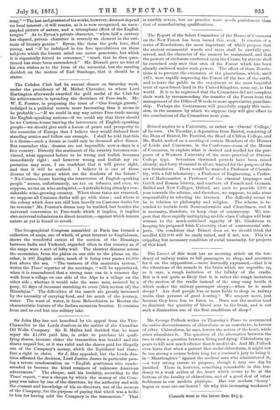The Lancet of this week has an amusing article on
the ten- dency of railway trains to lull passengers to sleep, and accounts for it on the supposition,—more learnedly expressed,—that it is the vibrations of the sounds in the brain which are soporific, or, as it says, a rough imitation of the lullaby of the cradle. But is it not quite as likely that it is rather the rough imitation of the motion of the cradle instead of the song sung beside it which makes the railway passenger sleepy,—when he is made sleepy ? Are deaf people less or more liable to sleep in railway trains than persons of good hearing? We suspect more, just because they have less to listen to. Does not the motion tend to diminish the quantity of blood sent to the brain, and is not such a diminution one of the first conditions of sleep ?


































 Previous page
Previous page